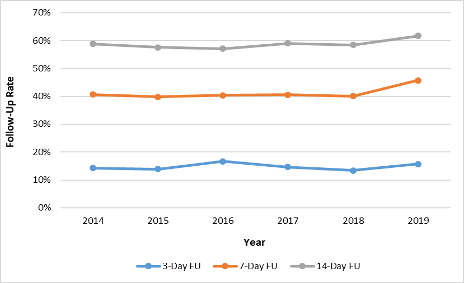|
|
Hospital and Physician Update |
|
July – August 2020 Michigan Value Collaborative: Combating congestive heart failureThis is the second in a series of articles on the successes of the Michigan Value Collaborative. The American College of Cardiology, American Heart Association and the Triple Aim Initiative all recommend that heart failure patients have a follow-up visit within seven to 14 days of discharge from a hospital. Despite these recommendations, the amount of people readmitted for heart failure remains consistently high. The Michigan Value Collaborative is helping to change that. It provides claims data to hospitals that allows them to see how they’re performing on this quality measure and many others. The data is then used by hospitals to develop strategies for improving quality and lowering health care costs — in short, providing value to Michigan residents. Tools and initiatives Here’s a look at a few of the initiatives developed by hospitals participating in the MVC that are designed to improve follow-up rates and reduce readmissions for patients with congestive heart failure: Working closely with skilled nursing facilities. MVC member hospitals have sought to develop stronger relationships with the skilled nursing facilities they work with most frequently. Facilities such as Holland Hospital, McLaren Port Huron and Memorial Hospital meet regularly with these SNFs to review the most common causes for readmission. This information is then used to inform internal processes and ultimately improve the transition of care from hospital to SNF. The regular discussions also provide a forum for discussing effective approaches to follow-up care, based on patient experience and outcomes. Developing educational resources. Several MVC member hospitals have developed educational materials for both patients and caregivers. For example:
Establishing heart failure clinics. As we noted in the MVC overview article in the May – June issue of this newsletter, information shared by MidMichigan Health at an MVC workgroup meeting a few years ago stimulated discussion of how establishing a heart failure clinic could help reduce readmissions and improve patient outcomes by ensuring timely follow-up visits after discharge from the hospital. Subsequently, Ascension Providence Rochester and Ascension Macomb-Oakland also developed heart failure clinics. For more information, check out the personal testimonial at the end of this article. Getting results The following chart shows post-discharge follow-up rates have improved over the past several years due in part to initiatives and tools instituted by MVC member hospitals: Follow-up rates after congestive heart failure inpatient discharge  Note: ICD-9, ICD-10 and CPT codes were used to identify CHF episodes. The chart contains data from multiple payers: Medicare Fee-For-Service, Blue Cross Blue Shield of Michigan PPO Commercial, Medicare Plus BlueSM, BCN Commercial and BCN AdvantageSM. Index event data are presented for the first six months of 2019 only. A testimonial Here’s what one MVC participant from Ascension Macomb-Oakland had to say about the value of participating in the MVC’s congestive heart failure workgroups: This workgroup provides me with the opportunity not only to focus, discuss and share ideas, resources and quality improvement initiatives on specific topics related to CHF but also to network with other CHF quality improvement specialists throughout the state of Michigan. The workgroup has helped me learn about other health system’s CHF programs. I have learned what works and what might not work as well. When the topic of heart failure clinics came up at a workgroup meeting, I identified this as a great way for my institution, Ascension Macomb-Oakland Hospital – Warren Campus, to reduce CHF readmissions. I gained knowledge about heart failure clinics from other workgroup attendees and learned about the benefit of opening a clinic for our patients. I put together a proposal for opening a heart failure clinic. The MVC analytic team was able to provide me with an analysis of the hospital’s readmission rates, cost analysis and benefits for our patients. This information was extremely helpful in getting the heart failure clinic proposal granted and the clinic was opened in June 15, 2018. It was great to see that a few of the MVC members came to the opening of the clinic. I have also been approached by a few other MVC members to share my experience in setting up and getting approval for the heart failure clinic. I am excited to continue my work with MVC. I hope to be an inspiration for other hospitals who struggle with CHF readmissions. To learn more
|
|
|
|
|
|
|
No portion of this publication may be copied without the express written permission of Blue Cross Blue Shield of Michigan, except that BCBSM participating health care providers may make copies for their personal use. In no event may any portion of this publication be copied or reprinted and used for commercial purposes by any party other than BCBSM. Blue Cross Blue Shield of Michigan and Blue Care Network are nonprofit corporations and independent licensees of the Blue Cross and Blue Shield Association. |

